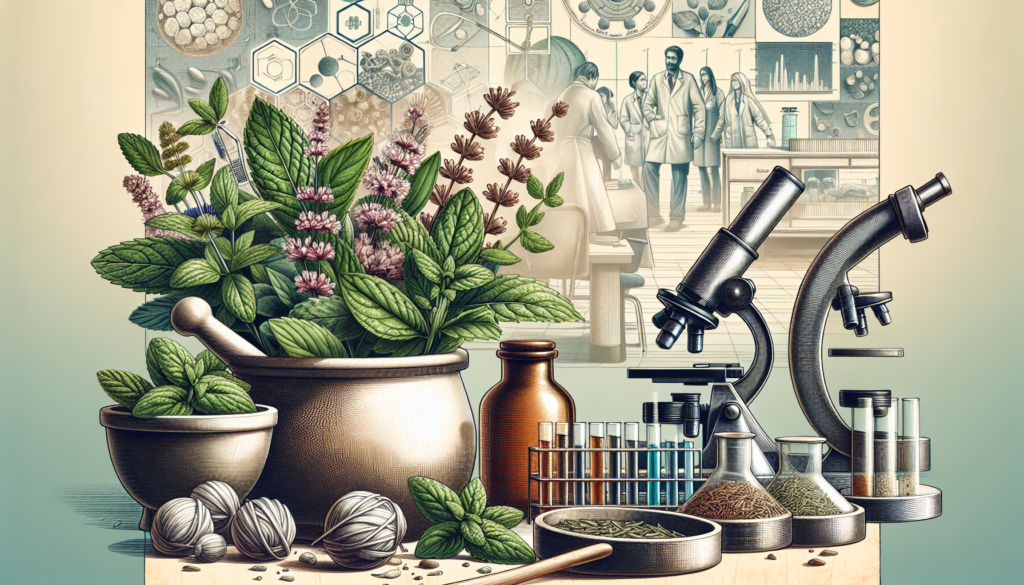So, you’ve probably heard people talk about the benefits of using herbs to improve your health and well-being. But, have you ever wondered if these herbs can actually be considered as medicine? Well, the answer may not be as straightforward as you think. While herbs have been used for centuries as a form of treatment, their classification as medicine is still a topic of debate among experts. In this article, we’ll explore the different perspectives on whether or not herbs can truly be considered as medicine, and delve into the potential benefits and limitations they offer.

Definition of herbs
Traditional definition
Herbs, in the traditional sense, refer to plants or parts of plants that are valued for their medicinal, culinary, or aromatic properties. These plants have been used for centuries by various cultures around the world for their healing properties and have played a significant role in traditional medicine systems. In this definition, herbs encompass a wide range of plants, including both the leaves and stems, as well as flowers, fruits, seeds, and roots.
Modern definition
In modern times, the definition of herbs has evolved to include not only the traditional medicinal plants but also plants used for culinary and aromatic purposes. Additionally, the modern definition recognizes the use of herbal extracts and preparations in various forms, such as capsules, teas, oils, and tinctures. This broader definition acknowledges the expanding use of herbs in day-to-day life, from enhancing the flavor of dishes to promoting overall wellness.
Types of herbs
Culinary herbs
Culinary herbs are those plants that are primarily used for adding flavor and aroma to food. These include popular herbs such as basil, rosemary, thyme, oregano, and parsley. Culinary herbs not only enhance the taste of dishes but also often provide additional health benefits. For example, garlic, a commonly used culinary herb, has been shown to have antimicrobial properties and can help support a healthy immune system.
Medicinal herbs
Medicinal herbs are plants that are used specifically for their therapeutic properties. They are often utilized in traditional medicine systems as natural remedies for various health conditions. Medicinal herbs can be effective in alleviating symptoms, promoting healing, and enhancing overall well-being. Examples of medicinal herbs include echinacea for immune support, valerian root for insomnia, and chamomile for relaxation and digestion.
Aromatic herbs
Aromatic herbs are plants that are valued for their pleasant scent. These herbs are often used in aromatherapy, perfumes, and cosmetics, as well as for culinary purposes. Common aromatic herbs include lavender, peppermint, sage, and lemongrass. In addition to their fragrance, many aromatic herbs possess therapeutic properties, such as calming the mind, relieving stress, and aiding in digestion.
History of herbal medicine
Ancient civilizations
The use of herbs as medicine can be traced back to ancient civilizations. From the Egyptians to the Greeks and the Chinese, herbal medicine played a vital role in their cultures. Ancient texts and records provide evidence of the extensive knowledge and use of herbs for healing purposes. Ancient Egyptians, for example, used herbs such as aloe vera and frankincense in their medicinal practices, while Ayurveda, an ancient Indian system of medicine, relied heavily on herbal remedies.
Traditional systems of medicine
Traditional systems of medicine, such as Traditional Chinese Medicine (TCM) and Ayurveda, have long recognized the value of herbs in maintaining health and treating illnesses. These systems view the body as a whole and aim to restore balance and harmony through the use of natural remedies, including herbal preparations. TCM, for instance, employs a vast array of medicinal herbs, such as ginseng and astragalus, to promote energy flow and restore the body’s equilibrium.
Herbal use in modern times
While modern medicine has progressed significantly, the use of herbs as a form of treatment has not been forgotten. In fact, herbal medicine continues to play a role in many cultures and is increasingly recognized by individuals seeking natural alternatives or complementary therapies. Herbalism has also gained popularity in Western countries, leading to the establishment of herbal clinics, the production of standardized herbal supplements, and the integration of herbal medicine into conventional healthcare practices.
Herbs as a part of traditional medicine
Cultural significance
Herbs hold immense cultural significance in various societies and are deeply woven into the fabric of many traditional healing systems. The knowledge of herbs and their uses is often passed down through generations, preserving cultural heritage. In some cultures, herbs are used not only for physical healing but also for spiritual well-being, symbolizing a connection to nature and the forces that govern existence.
Herbal remedies
In traditional medicine, herbs are utilized to create remedies that address specific health conditions. These remedies are often prepared using different parts of the plant, such as leaves, roots, or flowers, and can take various forms, such as teas, poultices, or decoctions. Herbal remedies are often personalized to the individual and may involve a combination of herbs to target multiple aspects of a person’s health.
Traditional healing practices
Traditional healing practices often involve the use of herbs in conjunction with other modalities, such as acupuncture, massage, or energy work. These practices take a holistic approach to healing and seek to restore balance not only in the physical body but also in the mind and spirit. By incorporating herbs into these healing practices, individuals can benefit from the synergistic effects of multiple therapeutic modalities.

Chemical composition of herbs
Phytochemicals
Phytochemicals are naturally occurring compounds found in plants that contribute to their medicinal properties. These compounds include flavonoids, terpenes, alkaloids, and phenolic compounds, among others. Phytochemicals are responsible for various biological activities in herbs, such as antioxidant, anti-inflammatory, and antimicrobial effects. The presence and combination of specific phytochemicals vary among different herbs, giving rise to their unique therapeutic benefits.
Active compounds in herbs
Within each herb, there are specific active compounds that are responsible for its medicinal effects. For example, St. John’s wort contains hypericin, a compound known for its antidepressant properties, while turmeric contains curcumin, a potent anti-inflammatory compound. Identifying and understanding these active compounds is crucial for determining the efficacy and safety of using herbs for medicinal purposes.
Effectiveness of herbal constituents
The effectiveness of herbal constituents is often influenced by factors such as the quality of the herb, its preparation method, and the individual’s unique biochemistry. Additionally, the synergy among different compounds within the herb can contribute to its overall therapeutic efficacy. While scientific studies have shed light on the effectiveness of certain herbal constituents, further research is needed to fully understand the mechanisms of action and optimize the use of herbs in clinical settings.
Herbs and their therapeutic benefits
Common health conditions treated with herbs
Herbs have been traditionally used as remedies for a broad range of health conditions. Some commonly treated conditions include digestive disorders, respiratory issues, skin problems, insomnia, anxiety, and pain management. For instance, ginger is known for its digestive properties, while eucalyptus is commonly used for respiratory congestion. Each herb possesses unique properties that make it suitable for specific health concerns.
Validated health benefits
Scientific research has validated the health benefits of numerous herbs. For instance, studies have demonstrated the efficacy of chamomile in reducing anxiety and promoting sleep, ginger in relieving nausea and vomiting, and ginkgo biloba in improving cognitive function. These validated health benefits have led to the integration of certain herbs into mainstream healthcare practices and have provided evidence for their therapeutic value.
Potential risks and side effects
While herbs offer a natural approach to healing, it is important to recognize that they are not without potential risks and side effects. Some herbs may interact with medications, cause allergic reactions, or have adverse effects on certain individuals. It is crucial to seek guidance from qualified practitioners when considering the use of herbs, especially when dealing with chronic or complex health conditions.
| Herb | Potential Side Effects | Health Benefits |
| Basil | May cause allergic reactions in some people |
Antibacterial, anti-inflammatory, may lower blood pressure and cholesterol
|
| Chamomile | May cause drowsiness, allergic reactions, or interact with medications |
Relaxation, sleep aid, may reduce anxiety and inflammation
|
| Cilantro | May cause skin irritation in some people |
Rich in antioxidants, may support heart health and digestion
|
| Garlic | May cause bad breath, heartburn, or interact with medications |
Antibacterial, antiviral, may boost immune system and support heart health
|
| Ginger | May cause heartburn, stomach upset, or interact with medications |
Antioxidant, anti-inflammatory, may aid digestion and reduce nausea
|
| Lavender | May cause skin irritation, drowsiness, or interact with medications |
Relaxation, may reduce anxiety and improve sleep
|
| Mint | May cause heartburn, stomach upset, or interact with medications |
Aids digestion, may freshen breath and relieve nausea
|
| Oregano | May cause allergic reactions in some people |
Antibacterial, antifungal, may boost immune system
|
| Parsley | May cause allergic reactions in some people |
Rich in vitamins and minerals, may support kidney health and bone health
|
| Turmeric | May cause stomach upset, diarrhea, or interact with medications |
Anti-inflammatory, antioxidant, may support brain health and joint health
|
Important Notes:
- This table is for informational purposes only and should not be considered medical advice.
- Always consult with a healthcare professional before using any herbs, especially if you have any underlying health conditions or are taking medications.
- The potential side effects listed are not exhaustive and may vary depending on the individual and the form in which the herb is consumed (e.g., tea, supplement, essential oil).
Regulatory status of herbs
FDA regulations
In the United States, herbs and dietary supplements are regulated by the Food and Drug Administration (FDA). While the FDA does not specifically approve herbs as drugs, they do enforce regulations to ensure the safety and quality of herbal products. Manufacturers are required to meet Good Manufacturing Practices (GMP) and provide accurate labeling, including proper identification of ingredients and potential allergens.
Supplement industry guidelines
The supplement industry has established its own guidelines and standards to ensure the quality and integrity of herbal products. Organizations such as the United States Pharmacopeia (USP) and the National Nutritional Foods Association (NNFA) provide certification programs and quality seals that manufacturers can voluntarily pursue. These guidelines aim to promote transparency, consistency, and consumer confidence in herbal products.
Labeling and claims
Herbal product labeling must comply with FDA regulations, providing accurate and honest information to consumers. Labeling should include the common name of the herb, the part of the plant used, and any warnings or contraindications. Additionally, herbal products are prohibited from making unsubstantiated claims about curing or treating specific diseases. It is essential for consumers to read and understand the product labels before use.
Integrative medicine and herbs
Herbs in conjunction with conventional medicine
Integrative medicine recognizes the value of combining conventional medical approaches with complementary therapies, such as herbal medicine. By incorporating herbs into conventional treatment plans, individuals can potentially benefit from enhanced healing outcomes and reduced reliance on pharmaceutical interventions. However, it is important to work with healthcare professionals who are knowledgeable in both conventional medicine and herbal medicine to ensure safety and efficacy.
Evidence-based use of herbs
The evidence base supporting the use of herbs in integrative medicine is continuously expanding. Clinical trials and scientific studies contribute to the body of knowledge surrounding herbs, allowing healthcare professionals to make more informed decisions about their use in clinical practice. Evidence-based use of herbs involves considering the available research, individual patient factors, and the integration of herbs within a comprehensive treatment plan.
Safety considerations
While herbs are generally considered safe, it is crucial to take into account individual health conditions, potential herb-drug interactions, and proper dosage when using them in conjunction with conventional medicine. Healthcare professionals in integrative medicine can help assess potential risks, determine appropriate dosages, and monitor for any interactions or adverse effects. Open communication with healthcare providers is key to ensuring the safe and effective integration of herbs into one’s healthcare routine.
Research on herbs
Clinical trials
Clinical trials are essential for assessing the efficacy and safety of herbs. These trials involve rigorous scientific methodologies and help establish evidence-based guidelines for the use of herbs in healthcare. By evaluating the effects of herbs in a controlled setting, researchers can determine their clinical relevance, optimal dosages, and potential side effects. Clinical trials provide valuable insights that contribute to the overall understanding of herbs as medicine.
Scientific studies
Scientific studies, including laboratory experiments and observational studies, provide additional evidence regarding the mechanisms of action, bioavailability, and potential interactions of herbs. These studies investigate the chemical composition of herbs, their pharmacological properties, and their physiological effects. The findings from scientific studies help establish the foundation upon which clinical trials and evidence-based guidelines for herbal medicine are built.
- “Bioavailability of Herbal Medicines: Challenges and Approaches” by Upadhyay et al. (2018): https://www.sciencedirect.com/science/article/pii/B9780128008744000106
- “Curcumin Bioavailability: Comparison of Curcumin Capsules and Nanoparticle Formulations” by Shah et al. (2017): https://www.ncbi.nlm.nih.gov/pmc/articles/PMC7206872/
Quality of evidence
It is important to recognize that the quality of evidence supporting the use of herbs varies. While some herbs have a robust body of research supporting their therapeutic benefits, others may have limited or conflicting data. Different types of evidence, such as randomized controlled trials, systematic reviews, and meta-analyses, contribute to different levels of certainty in the evidence base. Understanding the quality of evidence is crucial for both healthcare practitioners and individuals considering the use of herbs.
Public perception of herbs as medicine
Consumer attitudes and usage
Public perception of herbs as medicine has undergone significant changes over the years. More and more individuals are seeking natural and holistic approaches to health and are turning to herbs as a complementary or alternative form of treatment. Consumer attitudes towards herbs as medicine range from skepticism to enthusiastic adoption, with many people incorporating herbs into their daily routines for prevention, symptom management, and overall well-being.
Media portrayal of herbal medicine
The portrayal of herbal medicine in the media can influence public perception. While some media outlets emphasize the potential benefits and growing scientific evidence supporting the use of herbs, others may highlight sensationalized stories or express skepticism. It is important for consumers to critically evaluate the information presented in the media and seek reliable sources when making decisions about their health and the use of herbs.
Growing popularity and acceptance
The popularity and acceptance of herbal medicine have been steadily increasing in recent years. This can be attributed to various factors, including a desire for natural alternatives, dissatisfaction with conventional medicine, and a shift towards holistic approaches to health. With the availability of information and increased awareness about herbs, more individuals are embracing herbs as a part of their healthcare routines, leading to a growing acceptance and integration of herbal medicine within mainstream healthcare.






